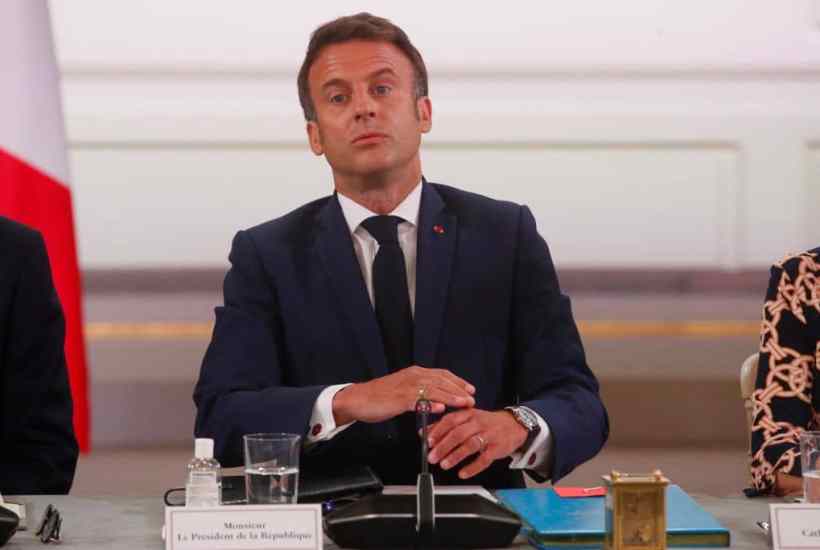Emmanuel Macron recently changed the name of his party from En Marche to Renaissance but so far all that has been revived are sordid accusations concerning some of his party members.
Last week, Jérôme Peyrat withdrew his candidature in the fourth district of the Dordogne from next month’s legislative elections after the media had made much of his conviction in 2020 for domestic violence against his wife. That Peyrat was nominated in the first place could be considered a stunning misjudgement, particularly from a president who famously declared in 2016 that he is ‘profoundly feminist’.
Peyrat resigned as one of Macron’s advisors in January 2020 after a preliminary investigation was launched into allegations of domestic violence against his partner. She spent two weeks off work recovering from bruises to her face, neck, shoulders, arm and wrist, and Peyrat was subsequently sentenced to a suspended fine of 3,000 euros (£2,500) by a court in Angoulême.
Macron possibly hoped that the public had forgotten – or forgiven – Peyrat for his offence, and his party chief, Stanislas Guerini, initially rallied to the defence of the candidate. He was, so he said in an interview last Wednesday, an ‘honest man’, and the case was more ‘complex’ than it appeared at first glance. Guerini added that he did not believe Peyrat ‘is capable of violence against women…if I had the belief or even the suspicion that we were dealing with someone who could be violent and guilty of violence against women, I would never have accepted this nomination’.
Within hours, Peyrat’s political aspirations were no more and Guerini was expressing his regret on Twitter if his earlier words had ‘offended and hurt’. He also pledged his party’s commitment to ‘supporting the liberation of women’s voices on acts of violence, so that the judiciary can do its work’.
Opposition parties seized on the scandal, none more so than Jean-Luc Melenchon’s left-wing alliance (NUPE), who have themselves been embroiled in controversy this month. In their case it concerned Taha Bouhafs, who was accused of ‘rape, multiple sexual assaults and sexual harassment’, charges he denies. He nonetheless withdraw his candidature amid mutterings among some on the left that he was a victim of racism.
In response to Peyrat’s withdrawal, the NUPE candidate in the Dordogne mocked Macron as the president who ‘made the issue of violence against women the ‘great cause of his first term and then nominated a candidate convicted of domestic violence’.
The scandal took some of the shine off Élisabeth Borne’s appointment last week as the new prime minister of France, only the second female to hold the position. Among her new ministers was Damien Abad, responsible for solidarity, autonomy and disabled people. The 42-year-old who has arthrogryposis – a disorder characterised by joint deformities that restrict movement in the hands and feet – has long been held up as a politician who has overcame great adversity on his way to the top.
Since Saturday, he stands accused of two counts of rape. Abad is vigorously denying the accusations claiming that they ‘relate to acts or gestures that are simply impossible for me because of my disability’.
In an article in today’s Liberation the paper states that few within his former party, the Republicans, are ‘astonished’ at the revelations and that when Abad defected to Macron last week he left behind a reputation as a ‘persistent womaniser’.
There was a time when such a description was a badge of honour among most male politicians in France – former president Jacques Chirac was a notorious womaniser who was known among his many conquests as ‘Monsieur-Five-Minutes-Shower-Included’ – but no longer.
Macron was surely aware of questions over Abad’s past before he was named in his new government because the Observatory of Sexist and Sexual Violence in Politics watchdog brought the allegations to the notice of his Renaissance party earlier this month. However, Elisabeth Borne said on Sunday that she had no prior knowledge of the accusations.
The case is an early test of her leadership. The incidence of sexual violence in France rose by 33 per cent last year, an alarming statistic that the Ministry of the Interior attributed in part to a greater confidence among women that under Macron’s government their claims will be properly investigated.
Were Abad’s accusers taken seriously when they filed their complaints? Or is he the victim of political score-settling by his enemies? This is what prime minister Borne must decide. One thing is already certain, that the age of the lothario in French politics is over.
Got something to add? Join the discussion and comment below.
Get 10 issues for just $10
Subscribe to The Spectator Australia today for the next 10 magazine issues, plus full online access, for just $10.





















Comments
Don't miss out
Join the conversation with other Spectator Australia readers. Subscribe to leave a comment.
SUBSCRIBEAlready a subscriber? Log in